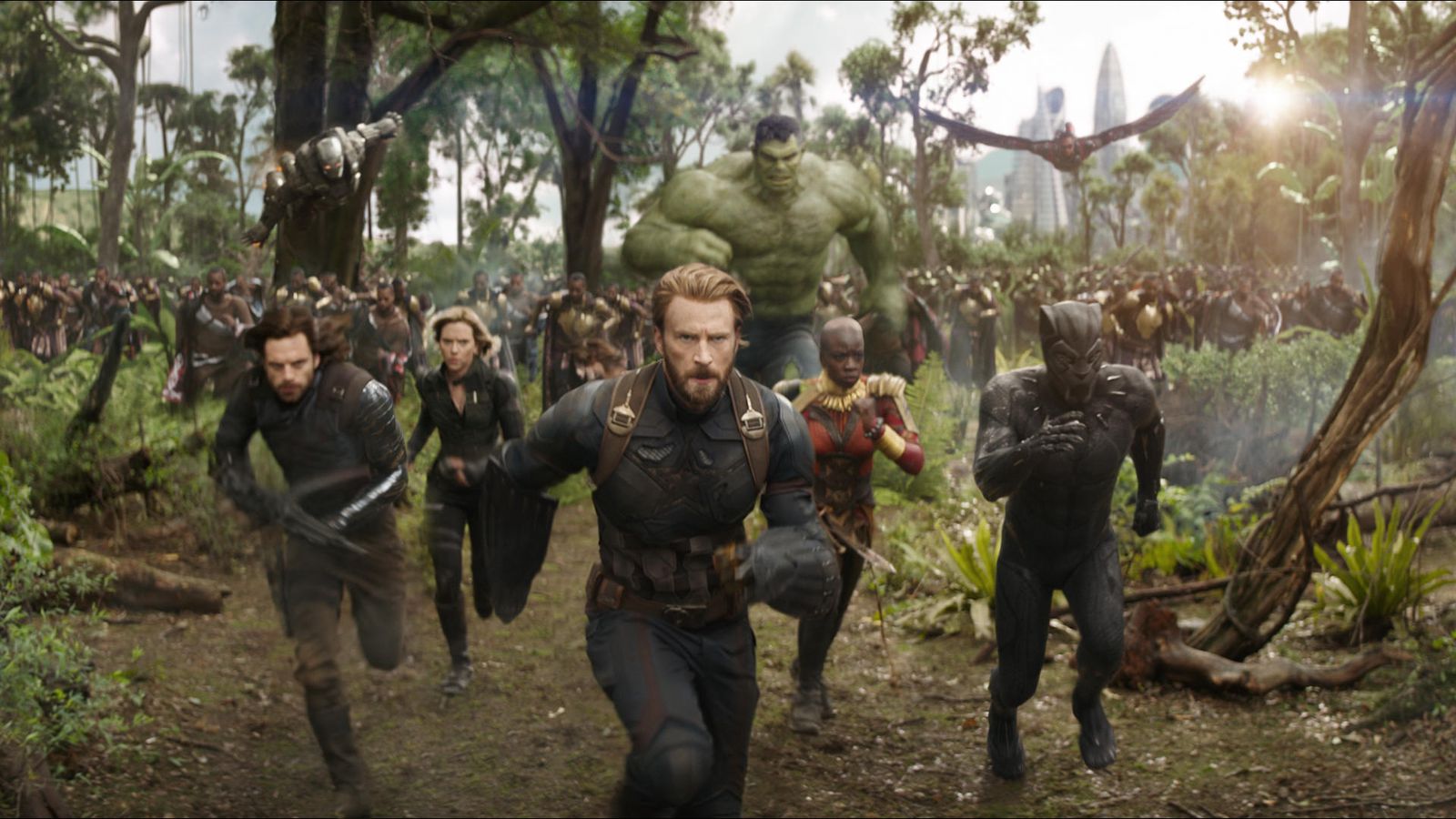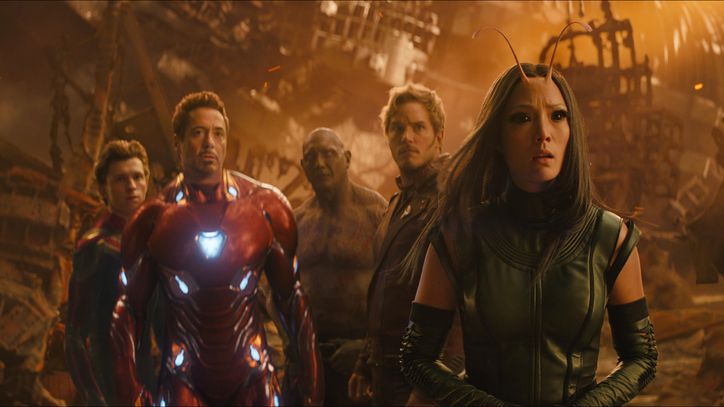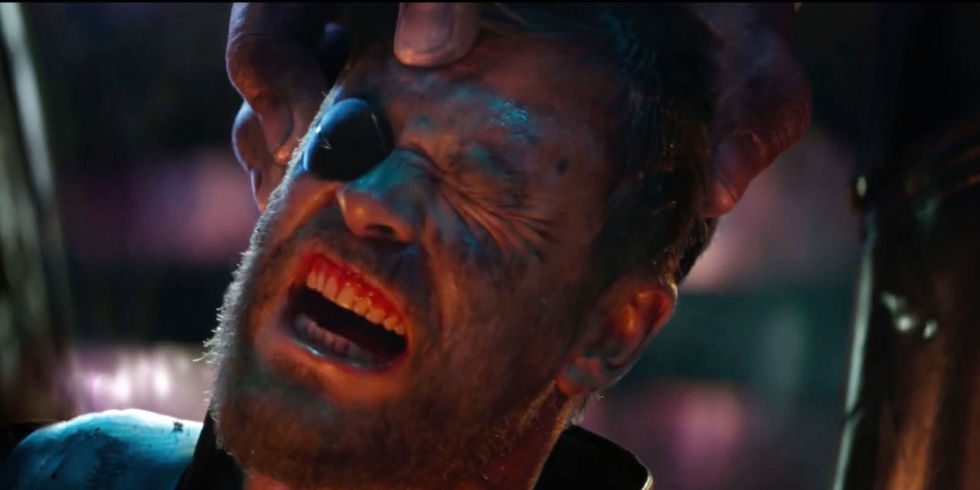Avengers: Infinity War truly feels like a movie that has been a decade in the making. Ever since Samuel L. Jackson showed up at the end of Iron Man in 2008, all of Marvel Studios’ output has led to this, explicitly starting with the end-credits teaser in The Avengers. This is one of those rare films that not only feels like an event, but actually becomes one. Sure, the cynical viewpoint is that none of these characters are real, and are furthermore so enhanced by CGI trickery that it’s like watching a video game cut scene.
Maybe that’s true, and those who espouse that belief seem to truly embrace it. And that’s fine. But the fact is that Marvel has dominated the box office for ten years now, and these characters are part of the fabric of modern-day pop culture. To get them all on screen together is a monumental achievement; to use them in a story with actual stakes and emotionality is something akin to a miracle.
The plot hardly needs describing, as every Marvel film since Captain America: The First Avenger has concerned itself with Infinity Stones, the MacGuffins that motivate the franchise’s most psychedelic, experimental films (i.e. Doctor Strange, Guardians of the Galaxy; and no matter what you have to say about Thor: The Dark World, that final battle is a delight). Thanos, the Mad Titan (played by Josh Brolin), seeks to claim all six Stones so he can wipe out half the life in the universe. He repeatedly calls his genocidal plan “mercy,” as he aims to eradicate starvation and overpopulation. This is Infinity War‘s biggest problem, because Thanos’ motivation never seems all that important, even to him. In the comics, he fell in love with Death and was trying to impress her by racking up a body count, but I guess some things are still too crazy for the MCU.
Infinity War is a lot of movie – too much, in fact; this thing is definitely overstuffed. But is that necessarily a bad thing? This is the best kind of fan service, the kind that does right by its fans, even as it challenges them. The film moves at a nice clip, and doesn’t feel as long as its 149 minutes would suggest. Character introductions are quick and to the point; by the fifteen-minute mark, we’ve met Thanos, a major character has died, and Iron Man has teamed up with Doctor Strange, Spider-Man, and the Hulk (a downside to the introduction of Black Panther‘s nanotechnology is that both Iron Man and Spider-Man’s suits now lack that tactile quality they once had, and look more computerized than ever). Shortly thereafter, Thor meets up with the Guardians of the Galaxy, and what’s impressive about this movie is that all these encounters manage to feel organic.
Pretty much everyone in the film gets a hero moment (even Mantis!). Infinity War pulls off an impossible juggling act, given its ludicrous cast size. It doesn’t feel as though anyone gets short shrift here. Strangely enough, Doctor Strange and Thor seem to be the main characters. Benedict Cumberbatch is great as Strange, losing a lot of the cocksure smugness that made him seem so much like Tony Stark at first (Cumberbatch’s American accent also feels a lot less strained). Chris Hemsworth, who Marvel seemingly just discovered is actually very funny, is making a last-minute play for MVP status. A lot of Infinity War‘s best scenes belong to Thor, and Hemsworth brings a haunted quality to his work that gives us a sense of just how much he’s been through.
The performances across the board, in fact, feel lived-in and authentic (except for Scarlett Johansson, who has always played Black Widow as detached and sarcastic; she has barely changed as a character since Iron Man 2, and Elizabeth Olsen seems to have trouble with her Sokovian accent this time around). This is a film about consequences, and the actors reflect that. Bruce Banner is so traumatized from spending two years as the Hulk that he can no longer transform at will, or even at all. James Rhodes walks with robotic leg braces, a result of his fall to earth in Civil War. We feel as exhausted as these characters look, which is a feature, not a bug.
Of course, any movie of this nature or of this size lives or dies by its villain. He had only appeared as Thanos twice before (in Guardians and Age of Ultron), and the entire film rests on his shoulders. In a way, he is the protagonist of Infinity War. Brolin runs away with the role, his deep Texas twang giving way to world-weariness and determination. There is a palpable note of sadness in his performance as well, and it’s heartening to see that between this, Black Panther, and Spider-Man: Homecoming, Marvel seems to be actively addressing their villain problem (anyone remember Malekith? Or Kaecilius?). Thanos is so overly powerful, and the film’s resolution so bleak, that you wonder how Marvel can come back from this. It’s a stunning act of writing one’s self into a corner and challenging yourself to get out.
More than most Marvel films (save for maybe the Guardians series, Thor: Ragnarok, and Black Panther), this feels like a product of its creators, not a committee. Directors Anthony and Joe Russo – who also helmed Winter Soldier and Civil War – are uncommonly adept at handling an ensemble of this size, and the action in Infinity War is far less muddled than in most Marvel movies. Writers Christopher Markus and Stephen McFeely prove why they’ve written more of these movies than anyone else (and, yes, it would obviously be nice to see more women or people of color behind the scenes on these). Markus and McFeely still struggle, from time to time, with balance of tone, but the scenes here are so economical and easily weaved together that they can be forgiven the occasional slip-up.
The biggest complaint I have about Infinity War is that, despite everything that happens, it still feels incomplete. Maybe this is because I know Avengers 4 is coming next year. But it still works better as a cohesive whole than, say, Iron Man 2, which is basically a feature-length teaser for The Avengers. Sure, Infinity War might be half of a movie – but what a great first half.
4.5/5



